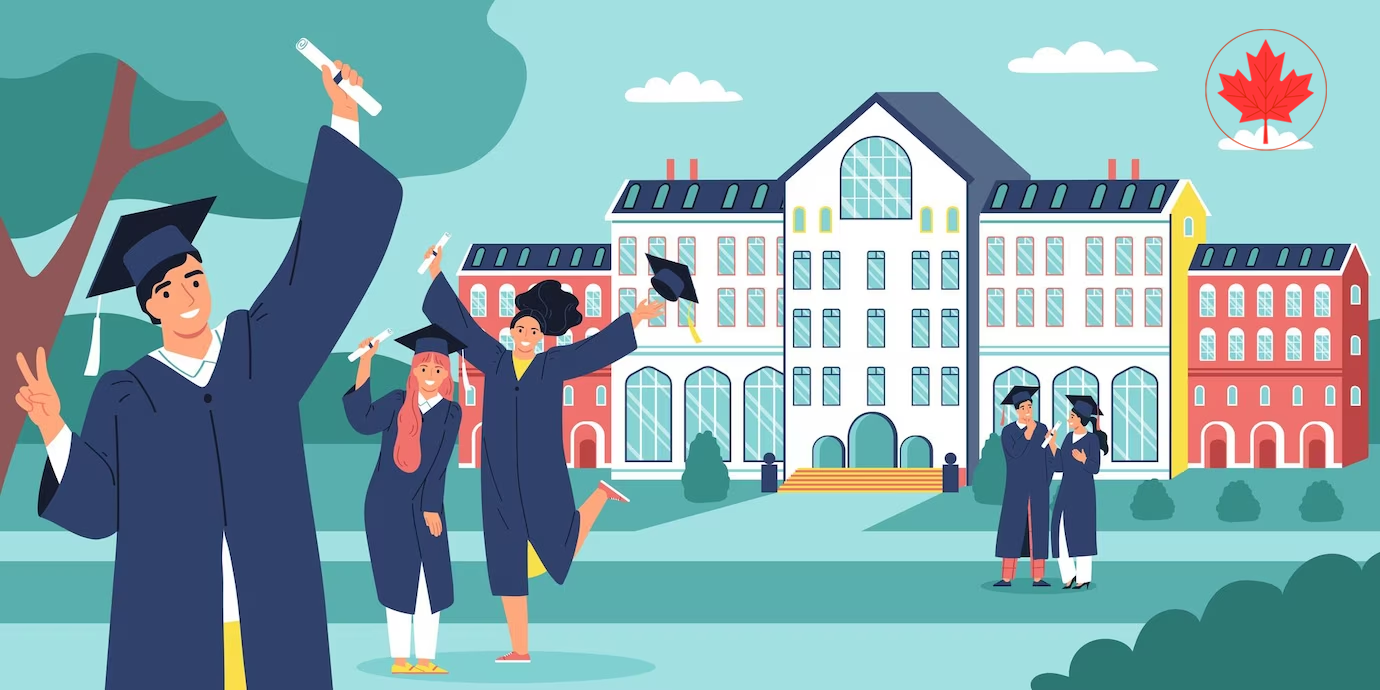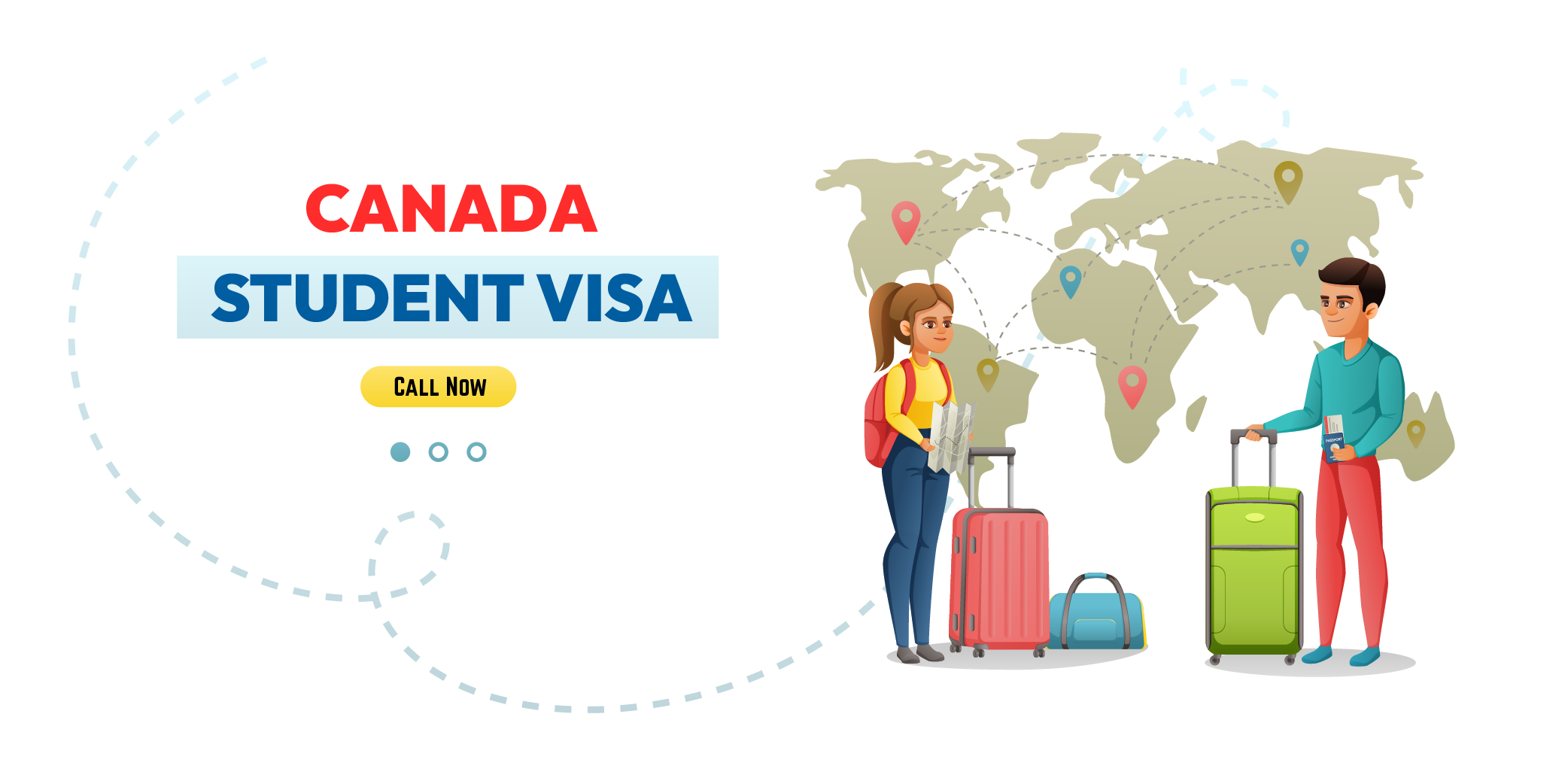
Study / Study in Canada
Home to nearly 500,000 international students, Canada is known for its globally recognized programs and quality education at affordable tuition fees. Adding to that its excellent quality of life and a great scope for after study employment opportunities and immigration opportunities, making Canada stand out as a popular study destination among Indian students.
Canada is one of the preferred study destinations for Indian students. There are many prestigious universities and colleges with affordable tuition fees. That's what makes it even more attractive. The fact that Canada offers some excellent employment opportunities is the icing on the cake. In Canada, in 2021, universities have a whopping 4, 50,000 new international students, it is a record number of enrolments. Student numbers surged due to travel restrictions and relaxed post-graduation work permit (PWP) rules. Other than that, it's well worth it for its scenic beauty, multicultural diversity, and warm people.

Canada offers international students a budget-friendly way of life, making it a better choice than other countries. The cost of living varies by region, but is still much better. The average cost of living ranges from CAD$ 700 to CAD$ 2,000, which equates to approximately Rs. 41,500 - Rs. 1,15,000.
Canada is home to many world-class universities that are respected around the world. A degree earned in Canada is highly respected. It is also worth noting that the World University Rankings include four Canadian cities in the top 100 best student cities in the world.
International students studying in Canada can work part-time for up to 20 hours per week. You can work full time during summer and winter holidays. This will allow you to earn extra money and spend it as needed. So experience the liberty it offers you.
Canada is a mix of busy city life and quiet countryside. From Niagara Falls to the Royal Ontario Museum, this land awaits your exploration. All of this ensures a better standard of living and career opportunities.
Good news for all Canadian researchers. Canada is committed to research and development, and the Canadian government is also committed to research and development. This makes Canada a better option for those inclined in science and research.
The government of Canada recently introduced several immigration benefits for international applicants. They are eligible for an additional work permit called the Post-Graduation Work Permit Program (PWP), valid for up to 18 months from summer 2022. This means more than double the benefits. You can return to your home country with confirmation of your international experience or settle forever in Canada.
Did you know that Canada has consistently been ranked one of the safest countries in the world? Canada was ranked the 10th most peaceful country in the world by the 2021 Global Peace Index. Don't worry either way; you are entitled to the same benefits as Canadians.
Almost every campus in Canada hosts a wide variety of programs, festivals, events and other activities, so there's always something for you to be entertained. This will also help you connect with new people and cultures and reduce homesickness.
The cliche "warm and friendly" is perfect for Canada. From quiet small towns to bustling cities, you'll find yourself in a cozy country with a unique culture to explore.
Canada is a place where you can experience things like never before. From white winters to red autumns, Canada offers something new each season. So go and see for yourself how good it is.
One of the main reasons why students choose to study in Canada is the quality of education. A student's graduation from a Canadian university is a sign of confidence and excellence. There are 26 Canadian universities in the QS World University Rankings 2019 and 27 of them are from The World University Rankings 2019.
One of the main reasons why Canadian education is unique is its emphasis on research and development. If you are a research professional, there is no better place than Canada. The Canadian government provides strong support for research in medicine, telecommunications, agriculture, environmental science and technology.
Tuition fees in Canada are considerably cheaper compared to US and UK universities. Given the return on investment, it is a perfectly practical option for Indian students. You can also apply for Canadian scholarships to keep your education costs down.
In Canada you can find very warm and welcoming people from different ethnic groups with different cultures and lifestyles. Canada's multicultural environment promotes amicable and peaceful coexistence more than any other country. Many Indians study, work and live here. You can also be a part of the festivals and rituals such as :
Canada is consistently ranked as one of the safest countries in the globally. In 2018, the Global Peace Index* ranked Canada her 6th most peaceful country in the world. As an international student, you enjoy the same privileges as any other Canadian.
Due to special regulations, Canada offers all international students the opportunity to work 20 hours per week during the academic year and full-time during the summer and winter holidays. If you work on campus or as an intern at a company, you do not need an additional work permit, as your study permit is sufficient to find you a part-time job.
All Canadian campuses have events, festivals and other activities scheduled throughout the year. This creates a happy and vibrant environment for all students, allowing them to network, meet new people and keep homesickness away.
One of the main reasons Canada is so popular with students is its inexpensive, high-quality education. The Canadian government spends liberally on higher education and is one of the top three countries in the per capita spending on post-secondary education. Learn more about the Canadian education system.
Study levels in Canada
The Canadian education system is administered by provincial governments, so levels of learning and education may belong to different clusters with different names. Here's a summary :
| Qualification | Duration | Description |
|---|---|---|
| Certificates and Diploma | 1 to 2 years | Predominantly technical vocational and career-oriented programs |
| Associate degree | 2 years | Equivalent to the first two years of a four-year bachelor's degree. |
| Bachelor's degree | 3 to 4 years | A bachelor's degree that requires successful completion of secondary school. Course length varies by state and program type, but most courses last for four years. Certain states, such as Quebec, offer a three-year bachelor's degree. |
| Bachelor's Honours degree | 4 years | This requires a specific GPA or credit, major, or specialized program |
| Postgraduate diploma | 1 to 2 years | A post bachelor degree qualification |
| Master's degree (by thesis) | 1 to 2 years | Often referred to as a research master's degree. This mandates submission of a thesis for course evaluation and completion. |
| Master's degree (by non-thesis) | 1 to 2 years | This is a taught master's degree that does not require the submission of a thesis. |
| Doctorate or PhD | 4 to 7 years | Awarded to PhD students for completing a dissertation and successfully defending their work before a faculty panel |
| Post-Doctoral Programs | No time limit | Professional research-oriented program |
There are diverse types of qualifications offered by different institutions in Canada.
This exceptional platform combines classroom instruction with hands-on work experience to bring you more structured and practical learning. This is a great path for international students who don't want to get stuck in a completely lecture-based education. Please note that a work permit is required as 50% of the program includes work experience.
September is the peak month for enrolment in Canada, with the highest number of enrolments. Most colleges and universities admit in September and in January, but summer admissions start around April or May.
Research and analysis with active participation, presentations, assignments, and lab tests are the cornerstones of Canadian education. Classes are typically a combination of lectures, tutorials, and labs, with student sizes of approximately 30-200 students. Lectures may have larger student numbers, but tutorials are usually done in small groups to concepts. Canadian universities are focused on providing a holistic experience that gives students opportunities to improve their studies, careers and lives.
Compared to the UK, Australia and New Zealand, Canada has the lowest tuition fees for international students. 7,000 - 29,000 CAD (indicative costs) is required annually to cover tuition fees. Yet, this is only a general guide and costs will vary depending on the institution and program you apply to, your location, and your lifestyle.
Indian students applying to Canadian Institutions receive financial assistance in the form of scholarships, grants, bursaries, tuition fee waivers, etc. Please note that the amount and type of remuneration varies by institution and program. Scholarship awards are competitive, so we recommend that you begin the process approximately 8-12 months before your desired degree program begins. Here is an overview of the types of scholarships you can apply, based on your level of study.

A Canadian MBA is one of the most popular degrees around the world. MBA graduates specializing in big data or analytics are the most desired programs in Canada and Australia.
Computer science professionals and IT specialists are in great demand around the world. IT Project Managers and Software Engineers are among the top 10 most popular careers in Canada.
Engineering is another on-demand course in Canada. Engineering programs are most sought after, including civil engineering, electrical and electronic engineering, mechanical engineering, and chemistry.
Medicine, biotechnology, pharmacy, etc. will not diminish in importance and need to be truly competent and qualified. In most cases, a PhD in this field is mandatory for a good position.
The importance of media and journalism is increasing. This is partly due to an increase in new career opportunities such as digital and interactive design and digital marketing. Jobs in demand include marketing, public relations, visual effects and animation, creative and graphic design, and UX/UI design.
We can see that companies are now focusing on up skilling and training theirpresent employees. By doing this the counseling psychologists, work psychologists, HR managers, and career his consultants come into the spotlight.
Quantitative and analytical professionals are now growing in importance, which indicates an increase in demand. It is in high demand in financial services, retail, media, travel, healthcare, FMCG and more.
The energy industry now plays a major role in creating jobs in Canada. Areas in demand include physics and astronomy, geoinformatics, geology, mining, renewable energy, and more.
Considering issues such as global warming, food security and climate change, job prospects for Canadian agricultural experts, forest professionals, agronomists and agricultural consultants are increasing.
Canada is recognized as the world's leading Artificial Intelligence research centre with endless job opportunities. It is projected that over 34,000 inventive jobsV will be formed over the next decade.
The University of Toronto is one of the globally leading universities. It ranks among the top 10 in the world in nursing, physical education, anatomy and physiology, geography, informatics and education.
UBC is considered one of the finest and oldest universities. It is also known to be one of Canada's major libraries. UOB is ranked 37th in the 2022 World University Rankings, 13th in the 2022 Impact Rankings and 35th in the 2021 World Reputation Rankings.
McMaster University is best known for areas such as economics, social sciences, health sciences, natural sciences, engineering, and humanities. It was also named Canada's most research-intensive university in 2017, 2018 and 2019 by Research Info source.
The University of Montreal offers several high-level courses, such as computer science programs and medical doctorate programs. It also has approximately 10,000 international students enrolled, the highest of any Canadian universities.
The University of Alberta has a strong reputation in the humanities, sciences, health sciences, business and creative arts. It is also one of the world's leading public research-intensive universities.
Located in the integral part of the capital city Ottawa, the University of Ottawa is the largest bilingual university in the world. In addition, the employment rate of graduates is 97%.
The Memorial is one of the top 20 universities in Canada. It also ranks among the top three Canadian universities in terms of percentage of corporate-funded research revenue. Another notable fact is that they have the lowest tuition fees in the country.
The York University in Canada hosts the largest liberal arts program in the country. It was also ranked 33rd out of 767 universities for consecutively twice in a row by Times Higher Education (THE).
The University of Calgary is located in Canada's safest cities. It was ranked 7th in the Academic Ranking of Canadian Universities (ARWU) and 10th in the QS World Rankings.
Canada is considered one of the most popular study abroad locations in the world, mostly among students from India. Compared to nations such as the US and UK, Canada provides education at a lower price. In the recent years Indian students have increased drastically from 48,765 in 2015 to 2,19,855 in 2019. Canada's graduate program and its one-year postgraduate program are considered cheaper compared to undergraduate/Diploma programs.
Study Programs
| Degree | Average Fees (CAD) | Average Fees (INR) |
|---|---|---|
| UG | CAD 30,000 | INR 16,15,000 |
| PG | CAD 20,000 | INR 9,54,000 |
| PG Diploma | CAD 17,744 | INR 9,08,772 |
| Diploma | CAD 10,000 | INR 7,76,086 |
| PhD | CAD 25,000 | INR 19,40,213 |
Canada is one of the most inexpensive countries in the world, mainly for international students. The usual cost of living in Canada ranges from CAD $15,000 to CAD $20,000. Again, this depends on where you live and your lifestyle. Please note that these costs will inevitably depend on your tuition fees.
| Type of Expense | Amounts in CAD |
|---|---|
| Food | CAD 300 |
| Accommodation | CAD 400 - CAD 600 |
| Transportation | CAD 100 - CAD 250 |
| Internet | CAD 30 - CAD 60 |
| Miscellaneous | CAD 600 - CAD 700 |
Requirements
It takes 3 years to get a bachelor's degree in Canada, but depending on the university, it can take anywhere from 6 months to a year to get a bachelor's degree. In grade 12, approximately 70% is required. The Paper-Based TOEFL Test (TOEFL PBT) takes 580-600 minutes. Similarly, the computer-based TOEFL test (TOEFL CBT) takes 237-250 minutes. Again, this varies by university.
Canada has a very flexible admission process for Diploma programs. A minimum of 60% may be required in grade 12. TOEFL PBT should be 550 minutes and CBT 213 minutes. Additionally, some universities may require his IELTS score of around 6 or 6.5.
Master's degrees are of two types in Canada. One is a thesis-based master's program in which you are required to submit a thesis during the course, and the other is a non-thesis-based master's program in which you are not required to submit a thesis. 2-3 years work experience and you may need a 4 year bachelor's degree. TOEFL CBT is 237-250 minutes and PBT is 580-600 minutes. Your IELTS score should not be less than 6.
If you are considering studying in Canada, you should find out about the various tests and exams you may need to take. It depends on the course and program chosen and it comprises of the following exams :
Non-native English speakers may be required to take the IELTS test in order to study in Canada. International English Language Training System (IELTS) scores vary from 5.0 to 7.5 depending on the university and degree program. However, a minimum score of 6.0 is required to obtain a Canadian visa. It tests candidate's skills like listening, speaking, writing and reading. The sessions for listening and speaking are the similar for all students, but the other two sessions vary by course. The cost of this test is approximately Rs 15,000.
The Test of English as a Foreign Language (TOEFL) is typically carried out as either a Paper-Based Test (PBT) or an Internet-Based Test (IBT). A TOEFL IBT rating among 90-100 can be essential to get right into a Canadian university. TOEFL test fee is approximately Rs.14, 000.
The Pearson Test for English well known as the PTE is popular amongst the Canadian Institutions. The PTE test fee is approximately Rs 13000 and this score is normally valid for 2 years.
A Graduate Management Admission Test (GMAT) is applicable only to those who want to pursue Business Management. It is valid for5 years.
Scholarships for Indian students in Canada are of 3 types.
Canadian government-funded scholarships :
This category is basically given in the form of awards to inspire students to pursue study there.
Non-government scholarships :
This category is awarded by several trusts & other communities to students who study particular courses.
Scholarships :
These are provided by colleges and universities to the students who study with them.
| Scholarship | Details | Amount awarded (CAD) |
|---|---|---|
| Banting Postdoctoral Fellowship | It is given to students who are pursuing a postgraduate degree in environmental and social science or health studies for two years. | CAD 71,263 |
| Vanier Graduate Scholarships | It is awarded to doctoral students enrolled in natural sciences, engineering research, health research, social science research, and humanities research for a period of three years. | CAD 50,915 |
| IDRC Research Awards | This scholarship provides one year of support to students pursuing master's or postdoctoral degrees. | CAD 15,268 |
| Anne Vallee Ecological Fund | Students pursuing doctoral degrees in animal sciences at universities in British Columbia or Quebec are eligible to apply. | CAD 1527 |
| Trudeau Scholarships & Fellowships | These are given to doctoral students who are conducting research in the areas of human rights and dignity, people and their natural environment, responsible citizenship, or Canada and the world. | CAD 61,080 |
| York University International Student Scholarship | A minimum CGPA of 7.80 is required to avail of this scholarship | CAD 1,38,505 |
| University of Calgary International Entrance Scholarship | Students pursuing a full-time UG program, with a minimum GPA of 3.20 can apply for this | CAD 14,840 |
| University of Manitoba Graduate Fellowships | Those students with a minimum GPA of 3.0 will only be considered for this fellowship | CAD 13,854 |
| The University of British Columbia Scholarship | Those on a study permit who have not been nominated for the need-and-merit-based International Scholars Award are eligible. | CAD 39,593 |

Indian students, in particular, continue to be very popular International students in Canada. Any foreign student who wishes to pursue academic studies in Canada must first acquire a current study visa from Canadian Immigration. You must be accepted by a Designated Learning Institute and have a stellar medical history, a spotless criminal background, sufficient money in the bank, and an acceptance from DLI (Designated Learning Institute).
Documents Required for your Study Permit
To apply for your study permit, you will need :
You must also demonstrate that you have the resources to cover your :
You will also be required to appear for a personal interview at the Canadian embassy or consulate.
To prove you can financially support yourself and any accompanying family members, you may be asked to provide:
With the introduction of the Immigration, Refugee and Citizenship Canada's Study Direct Stream (SDS) program, Indian students who wish to enrol in Canadian institutions and colleges can now anticipate expedited visa processing. Students from India can obtain their visas through SDS in 4-6 weeks, as opposed to the typical visa application process, which could take up to 2-3 months. However, you might require a few extra documents if you decide to apply through SDS. Not to worry; your IDP counsellor can help you with this effortlessly.
You must apply for your student visa online through the CIC's official website. You can apply up to three months before your planned trip to Canada. Remember that your application date is the date you pay your application fee.
Benefits of online visa application

Fill below form and we will get back!